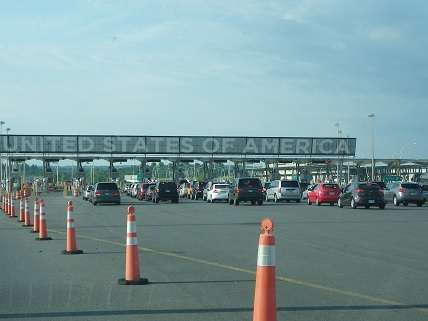Judges Rule on Police Practices Along the Canada-New York Border: No Unreasonable Searches, No Unreasonable Stops

A U.S. district judge ruled on Friday that cops in Niagara County, New York were wrong to detain a couple for hours for having windows tinted beyond what's allowed in the state (it was a permissible tint in Tennessee, where the car was registered) and that, further, from the Newspaper:
"Given that material issues of fact exist as to whether the continued detention of plaintiffs was constitutionally permissible, a reasonable fact-finder could find that it was objectively unreasonable for the officers to conclude that removal of plaintiffs to a border facility, a further search and x-ray of their car without their consent, and their continued detention for an unspecified amount of time, did not violate plaintiffs' constitutional rights," Judge [Richard] Arcara ruled.
The couple says in the lawsuit they were stopped because they were black.
Meanwhile, a county judge in St. Lawrence, New York earlier ruled the Border Patrol could not stop somebody just for driving carefully, even if a subsequent search turned up drugs. From the Newspaper:
Agent [Brandon] Carrier became suspicious and about an hour into the stop a drug dog was called to the scene, and a tire filled with marijuana was found in the trunk. This evidence, however, was thrown out because the traffic stop itself was deemed invalid and the Border Patrol had no business stopping them.
"The court believes that Officer Carrier decided to follow the white SUV and do a radio run because the driver appeared nervous," Judge [Kathleen] Rogers ruled. "Her actions were completely consistent with a person who was not engaged in any criminal activity. There was no basis to believe that a vehicle with a NYS license plate and registration had crossed the border or was engaged in any way with smuggling persons or contraband across the border."
Agent Carrier testified that he also became suspicious when he learned the car was registered to someone with the common Indian name of Deer.
"A vehicle stop must be valid at its inception: it cannot be bootstrapped into reasonable suspicion by mounting concerns over diverging explanations from the vehicle occupants as to their intended destination," Judge Rogers ruled. "His candid testimony that the occupants looked like Mohawks and that one had what Carrier believed is a Mohawk name, and that the car was listed for an address near the Mohawk Indian reservation bordered on improper racial profiling."
It may have turned out differently in the agent had said his dog alerted him from the beginning, based on the recent unanimous Supreme Court ruling that a dog's ok was enough to warrant a search by police.


Show Comments (12)